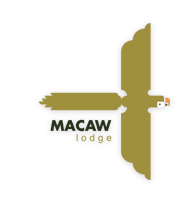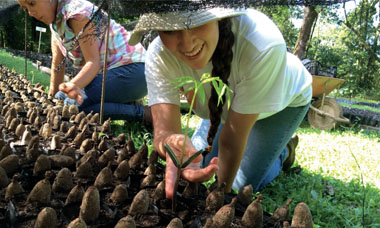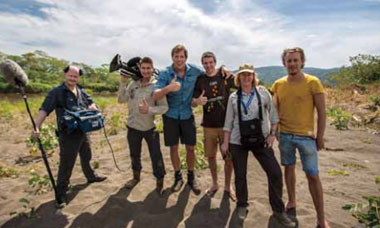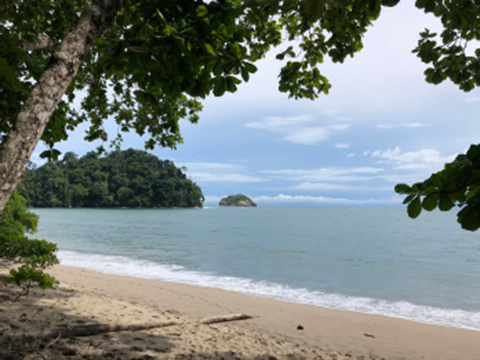May 2016
April 2016
April 2016
December 2015
December 2015
It has been an extraordinary year at Macaw Lodge, we have worked very hard to achieve self-sufficiency in our staple food. We are proud of being 100% self sufficient in rice and beans. For almost two years, we have produced more than half a ton of rice the traditional way, planted and harvested by hand.
Knowledge exchange with Surinamese Enviromental Congressmen
MACAW NEWS
Knowledge exchange with Surinamese Enviromental Congressmen
If there is a place where relaxation and learning meet and complement each other it is Macaw Lodge. Visitors come seeking nature: colorful birds, exotic trees, and the sounds of a distant waterfall. Coming all the way up Costa Rica’s Central Pacific coastal mountain to this unique ecohotel provides anyone with the perfect disconnection from city life. From yoga retreats to permaculture workshops, the environment and design of the place alongside it’s dedicated staff always provides a complete experience: culinary to educational, guests return satisfied and inspired.
The first Sunday of the year 2018, Macaw Lodge hosts a group of Surinamese Congressmen accompanied by and guided around Costa Rica by Carlos Rodríguez, ex Minister of Environment. He represents Conservation International, an NGO that as the name suggests, focuses on conservation all over the world. They have already worked with 35 countries in the 30 years they have existed and focus on working on efforts towards conserving biodiversity. Today, they bring Surinamese politicians to Macaw Lodge with the purpose of a knowledge exchange between founder and owner Pablo Gordienko, an expert in agroforestation, Mr. Rodríguez as part of Conservation International and the Surinamese government representatives. This program of CI seeks to support politicians in the making and implementation of environmental laws and politics.
Surinam is a country that could become as famous and successful as Costa Rica in regards to ecotourism. The smallest country in South America, it’s biodiversity just nearly as rich: from sea turtles, rare insects and snakes to jaguars and tapirs. In 2000, UNESCO (United Nations Educational, Scientific and Cultural Organization) declared the Natural Reserve of Central Surinam as a World Heritage. Just over 90% of this pristine jungle is untouched by humans. Conservation attempts are not as strong and comprehensive as Costa Rica’s but they are starting to grow.
Around noon, the dining table at Macaw Lodge is colorfully decorated and ready to receive guests. A gentle breeze flows over the lake and brings some cool to the midday heat. The view from the lodge is a well designed landscape of trees and plants ranging from green and yellow to purple and brown. Hummingbirds a few feet from the chairs add even more color and natural beauty to the environment of this evening. Warm greetings are exchanged with the freshly arrived Surinamese delegation and everyone gathers around plates that offer a salad with kale, moringa, spinach and tomatos fresh from the grounds of Macaw’s farm. Lunch also includes rice, squash and other vegetables grown and harvested from the same earth.
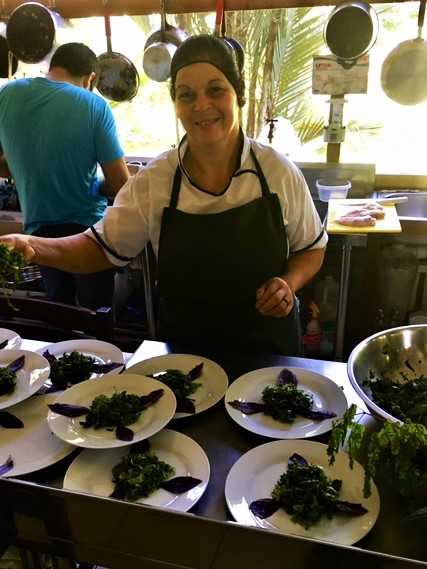
Naturally the dialogue takes that route, and each gives their interpretation of spicy, comparing local chilero to the peppers and spices used to in the condiment Roti back in Surinam. Then climate is discussed as similar but different: one degree North of the Equator, Surinam is even more tropical than Costa Rica. The Surinam rainy season brings an incredible amount of water to their forests and jungles and with this humidity, biodiversity is abundant and unique. Recently discovered and worth mentioning is the cocoa frog.
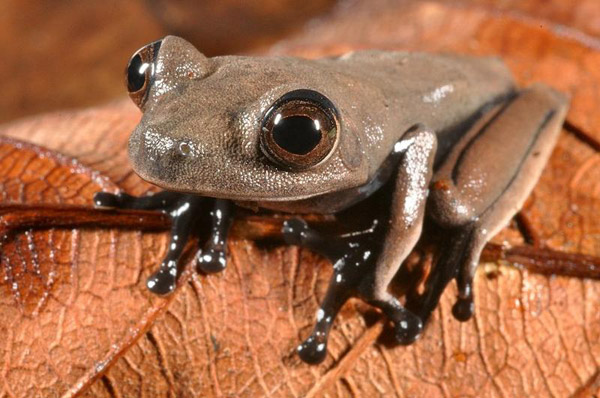
The topic of the day is reached, and Rodríguez explains how the carbon market in such countries has a lot of potential. He emphasizes on the importance of choosing the correct market. “It is not logical to compete with China or Brazil, one must aim for a premium market, credits can be created and accumulated. High quality carbon will acquire value in the upcoming years and our countries should be aiming to invest in these. In Costa Rica and the rest of the Americas this is happenning with coffee. It is predicted that in 2050 between 60% and 80% of Latin America’s coffee zones, and hence their production, will be affected by the increase in global temperatures. In the end, you must create a niche market, where coffee or the local product has its own brand.”

Gordienko, who specialized and is highly devoted to agroforestry and other environmental issues, explains about his case. Thirty years ago, environmental laws and climate were different. What used to be farmland with a few cows, he envisions and decides to invest in reforestation, planting different species from all over the world. At the end of the seventies, interestingly enough, Costa Rica had one of the world’s highest deforestation rates. Law 7575 was implemented soon after and incentives to plant where the government paid per tree helped avoid and change the country’s richness’s fate. Gordienko believes and promotes agroforestry (agroforestation) systems, where agriculture and forest systems are one.
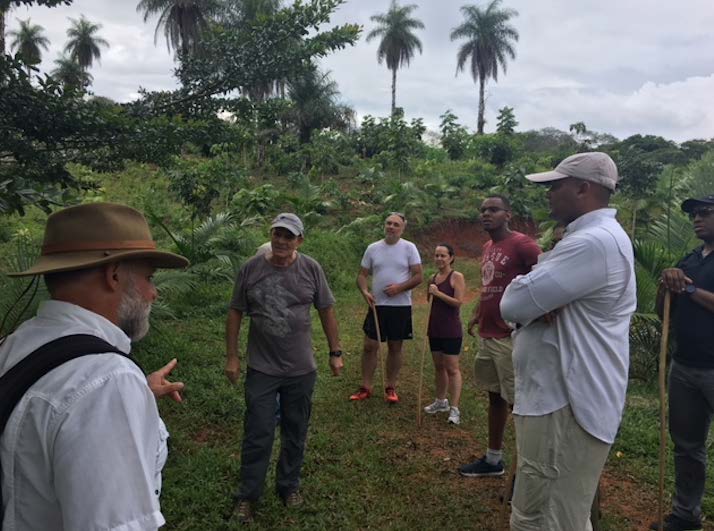
At Macaw, one of the highlights is cacao, a plant that benefits the environment as well as humans. The idea of agroforestry systems is also discussed and advocated by the National Fund of Forestry Finance (Fondo Nacional de Financiamiento Forestal). Costa Rica’s government is dedicated to protecting the environment and this endeavor reaches topics and places as far as they can.
In an agroforestry system, a 170 hectare land can make up to $8,000 in a year, which can make a difference in low income areas. FONAFIFO as well as Conservation International have pushed to show the importance of conservation, how the stronger simbiosis between human and nature the more benefits are given to all. Conservation can have and has had in many cases a high impact in low income communities. This is a message that not only Surinam and Costa Rica have to learn from.

Winston Ramotarsing, a Surinamese Congressman, describes the situation: “So far the government has decided to protect the forest and our green areas, but specific programs to protect the environment do not exist yet, and there is not much talk about sustainability. Our point of interest with Conservation International and coming to Costa Rica is this: learning how to create and implement a program that benefits the people. We are looking at examples from all over the world.”
Surinam has the resources, but it is a few steps behind from Costa Rica. When Grace Watamaleo is asked if she imagines this model applied to her country, she takes her time to respond. Looking around the cacao plantation surrounding the group she exclaims: “It is possible. The institution is in place. Legislation has to be more organized.” Every member seems to have some form of inspiration, and it is clear they will take these ideas back to their home to try and change the situation.

How are people involved?
Asiskumar Gajadien says this is the big problem, that people are not aware. It is not ignorance, since we all know and see the trees and animals around us, but we are not yet aware of their value, of the importance of conserving. There is a necessity to educate. “as long as they don’t feel, they won’t know.” The effoct has to come in this side, through education and exposure, consciousness can be created and respect for nature fostered.
Rowan Braybrook as a representative of Conservation International explains that this knowledge exchange is very important between countries of similar resources and climates. The lessons that legislators can adapt and apply to their own governments are invaluable. A well implemented law can bring tremendous benefits. The idea is that this model is financially sustainable in Surinam.
Lastly, Jerry A-Kum adds on his expectation that there is a higher utility of nature for tourism purposes. He wants to present alternatives to his people to enhance sustainability. Additionally the goal is to create consciousness, but also that it is financially benefitial. “Costa Rica is a great example of reinventing the wheel.”
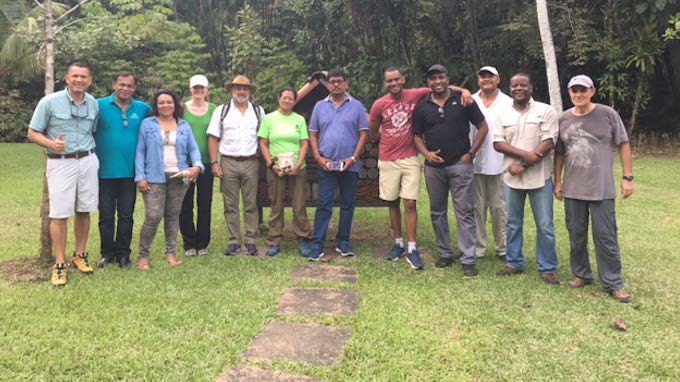
Ready to visit? To plan your travel and your stay, please feel free to reach out to us:
Email: travel@macawlodge.com
Whatsapp: +506 8762 9090
Phone: +506 8310 9073
Written by Gabriela Mateo
An unforgettable journey. The story of a traveller
Customer Experiences
An unforgettable journey. The story of a traveller
Despite Mother Nature’s best efforts, we succeeded in flying from Dayton to Charlotte and ended up in San Jose, Costa Rica. We transitioned from 11 degrees F to 50 degrees in Charlotte to 70 degrees in San Jose. What a change in one half day! The immigration line at the Airport was truly unbelievable. It was extremely long and ran back outside the customs hall to a long narrow hallway. Luckily for us, one of the security folks pulled us out of line and escorted us to a very short special line. Once through Customs, we emerged into chaos in the main terminal area. The entire area was jam packed full of taxi drivers looking for fares and companies picking folks up. Once again we lucked out and a gentleman took us outside where he called our driver and set up a meeting point.
Finally on the road, our driver, Coco, was very informative about what was going on around us. We are headed to the Macaw Lodge located up in the rainforest. Our ride was great, good roads, crowded but traffic was moving; then we turned off on a side road which Coco said was a little bit bumpy. That was an understatement! The next 45 minutes were on gravel, dirt and some paved roads. We went round and round curves and kept going up and up until, voila, we arrived at the Lodge.
The Macaw Lodge is located in the rainforest and is pretty much totally sustainable. The electricity is solar powered, the food harvested o”n site or locally sourced. The building was constructed with local materials. The main building at the Lodge is a beautiful octagon shaped structure with 8 guest rooms on the upper level. The rooms are all wood and bamboo walls, floor and ceilings. The bathrooms ha”ve stone floors and the water is solar heated. The downstairs area is a large open area for dining, gathering, and socializing. Our dinner, the first night, was a wonderful vegetable soup, followed by Spaghetti with local vegetables and Flan for dessert. Every meal is accompanied by a big pitcher of local fruit juice, which changes daily, based on availability. At night, guests go to bed to the sounds of nature in the surrounding area. The Lodge is amazingly quiet and peaceful. The 264 acre property began years ago as a reforestation project. All the trees and vegetation the owner planted were aimed at providing food and shelter for the local birds. Once this system was established, he added botanical gardens, orchards and greenhouses. The result is pure magic.
Our first morning, after a great breakfast, we headed out to hike to one of the waterfalls. We wandered up and down a trail made of some gravel, some clay, some concrete block steps and tons of beauty. The area is completely natural with large trees, stands of bamboo and under canopy plants. When we finally reached the waterfall, it was beautiful, isolated and very peaceful. A bench, place in the shade gave us a chance to sit back, relax and enjoy nature. Steve even decided to go for a swim in the pond at the base of the waterfall. Then back at the Lodge, we rehydrated, and relaxed before lunch. The list of birds we have seen is amazing, to name a few….Green Ibis, Kiskadee -Bientevemo Grande, Jacana Centroamericano, Limpkins- Carlao, and of course Macaws!
After a wonderful lunch of chicken, sweet potato mash and zucchini, we took up residence on the sunny side of the Lodge. We spent the afternoon relaxing and watching the local birds go about their daily routine. Following another outstanding dinner, this time vegetarian, we again relaxed in the rocking chairs and listened to the sounds of the night. The frogs and crickets were in fine voice, and extremely loud, as all the males were competing with one another. Our last night, we fell asleep to the sounds of the frog competition. This morning, we were up early to watch the birds come for breakfast. Megan, the manager, places bananas on the branches of a dead tree down near the ponds. It is quite fun to watch the birds gathering in anticipation. We even saw a duck try and perch on a branch with no luck! Once the bananas were placed, the birds showed up including a Scarlet Tanager and a Boston Oriole. After the excitement, we ate breakfast, interrupted by a sighting of a pair of mating Macaws….. babies on the way!
Unfortunately, today we leave this piece of paradise and head to Puerta Caldera to pick up the Azamara Quest for our cruise. Our stay at the Macaw Lodge has been amazing. Everything is done at a leisurely pace. If you are in the middle of eating and leave to go get a picture of something, everything is still there when you return. The Lodge is without a doubt one of the most peaceful places we have been, very few Americans even know about it, a well kept secret. We also lucked out because they were not very busy and we had the place pretty much to ourselves. Now we are off to the hustle and bustle of civilization! However we definitely hope to return here in the near future.
Pura Vida Amigos !!
Kate and Steve
Fabulous finds on the Pacific Coast
Fabulous finds on the Pacific Coast
Professor Amanda Bamford’s lecture on Costa Rican life zones © Matthew O’Donnell
During our time on the Pacific coast of Costa Rica we have been introducing the students to the practicalities of tropical field work. This has involved several lectures from the expert teaching staff as well as practical work in the forests around our field centre, from the diverse sampling techniques for invertebrates lead by Manchester Museum Curator of Arthropods Dmitri Logunov, to plant identification and plant dissection with Professor Amanda Bamford.
Alongside my lecture I have also been leading nightly herpetological walks, introducing the students to the exciting, exhausting and enthralling world of reptile and amphibian study.
This experience will be vital to prepare the students for La Selva Biological Station. Where they will be conducting their independent research projects. We have been fortunate to encounter many species of reptile and amphibians during the last week, and hopefully La Selva will prove to be just a fruitful! Below is a small sample of the species we have encountered.
We have also had the opportunity to visit some of the nearby reserves, including the world renowned Manuel Antonio National Park, where we were treated to some up-close mammal encounters!
We were also treated to a talk from Pablo Gordienko, the founder of Macaw lodge, who explained his vision for sustainability and self sufficiency which underpins the unique work of Macaw lodge, from running 100% off solar power, to growing large proportions of the menu in their own gardens. I would like to extend both my own and my colleagues sincere thanks to all the staff at Macaw lodge who made our visit very special!
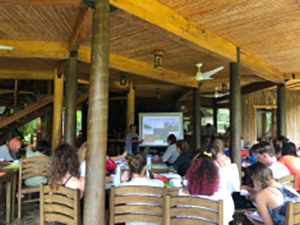
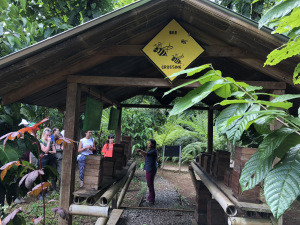
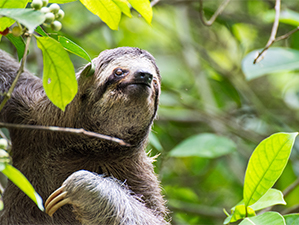
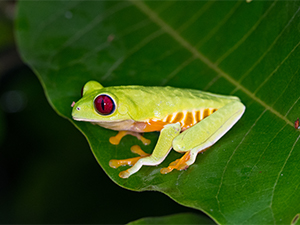
Posted on June 20, 2018 by matthewjodonnell
Macaw Lodge: More than Macaws
More than Macaws
CHOCOLATE FAIR: WE PARTICIPATED ONCE MORE
Neighboring Carara National Park in the Turrubares Mountains of Costa Rica’s Central Pacific region (approx. 45 minutes from Tarcoles), Macaw Lodge is a dream destination for birdwatchers and nature lovers in general. I had wanted to stay here ever since visiting for an afternoon several years ago, so I didn’t hesitate to say YES! when Macaw Lodge invited me to stay for several nights in support of my Big Year.
The lodge has a small pond and beautifully landscaped gardens surrounded by rainforest. The views of the surrounding countryside are gorgeous and Scarlet Macaw can be seen frequently flying overhead. Owned by Costa Ricans with a sincere concern for conservation and sustainability, Macaw Lodge is a true eco-resort, not just in name. All of the electricity is provided by solar power and almost all of the food (quite delicious, I might add) is grown organically on-site.
Over the course of three full days birding the lodge’s 264-acre reserve, I observed 153 species of birds including two lifers: Marbled Wood-Quail and White-tipped Sicklebill. Also new for the year were Least Grebe, Bank Swallow, Stub-tailed Spadebill, and Least Flycatcher, bringing my yearly tally to 640 species.
Other birding highlights included Costa Rican Swift, Lesser Swallow-tailed Swift, Charming Hummingbird, Baird’s Trogon, White-whiskered Puffbird, Golden-naped Woodpecker, Rufouswinged Woodpecker, Dot-winged Antwren, Chiriqui Foliage-gleaner, Golden-crowned Spadebill, Ruddy-tailed Flycatcher, Rufous Piha, Blue-crowned Manakin, Orange-collared Manakin, White-winged Becard, and Scaly-breasted Wren.
eBird Hotspot
http://ebird.org/hotspot/L3650798
eBird Checklists
http://ebird.org/view/checklist/S54322437
http://ebird.org/view/checklist/S54322439
http://ebird.org/view/checklist/S54331923
http://ebird.org/view/checklist/S54336775
http://ebird.org/view/checklist/S54343381
http://ebird.org/view/checklist/S54350066
http://ebird.org/view/checklist/S54365261
http://ebird.org/view/checklist/S54377399
http://ebird.org/view/checklist/S54402367
http://ebird.org/view/checklist/S54402403
http://ebird.org/view/checklist/S54404279
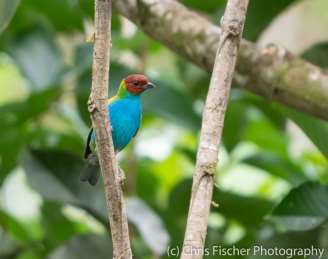

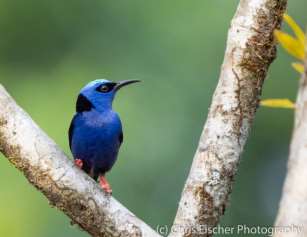
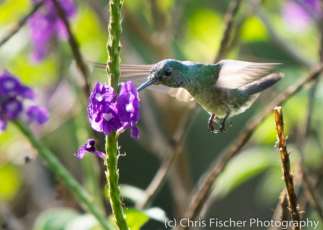
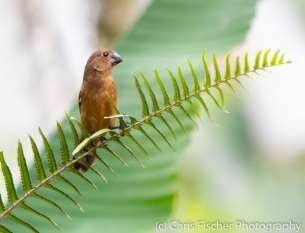
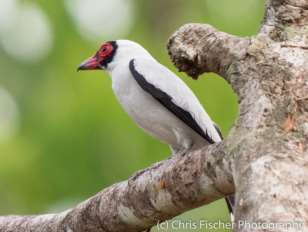
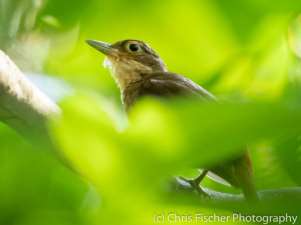

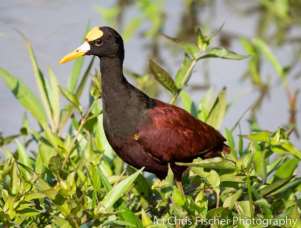
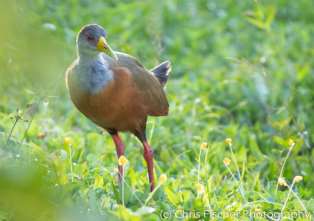
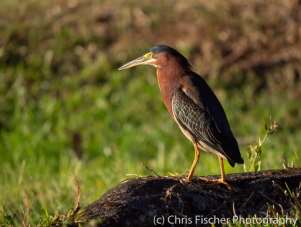
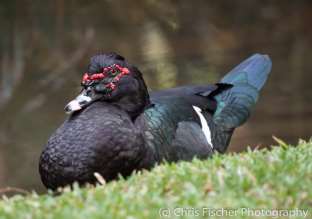
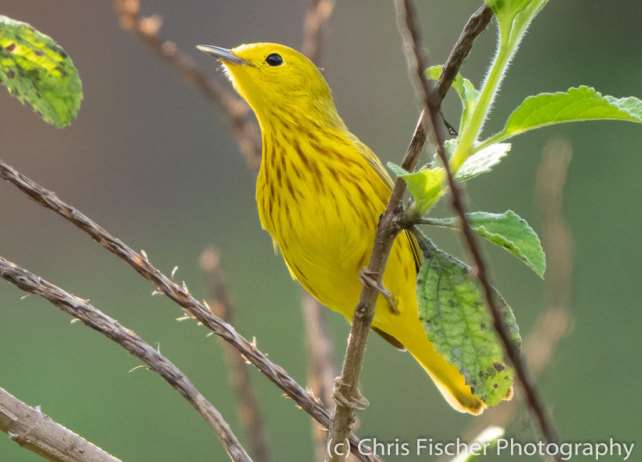
Ready to visit? To plan your travel and your stay, please feel free to reach out to us:
Email: travel@macawlodge.com
Whatsapp: +506 8762 9090
Phone: +506 8310 9073
Written by Gabriela Mateo
Newsletter: June 2022
Newsletter: June 2022
Chocolate, yoga, birding and more. This is what we have been up to the past few months. Macaw Lodge and Macaw Kakau continue to grow, provide experiences, and sustain the vision of the brand. We believe in creating connection to Nature and we are happy to share our news and pictures of our recent events with you!
CHOCOLATE FAIR: WE PARTICIPATED ONCE MORE
This June 2022 we participated in the sixth Chocolate Fair in San José with our iconic chocolate brand Macaw Kakau. It was a pleasure and a great experience to participate another year for multiple reasons: reconnecting with chocolatiers from other parts of the country, promoting our brand and new products, and exposing ourselves to the public.
Yorleny comments:
‘We gathered and connected with so many people. That’s what fairs and expos are for. It took place June 4th and 5th at ‘La Antigua Aduana’, translated as ‘Old Customs’, a big building located at the corner of Barrio Escalante. The purpose is to meet other cacao fanatics, or people who also love chocolate. We intended to meet people, and for people to meet us. We want the public to know where we are, what our products taste and look like, and to find new clients, even business partners. It’s a unique experience. There was a lot of social interaction, which is very different than life at Macaw.
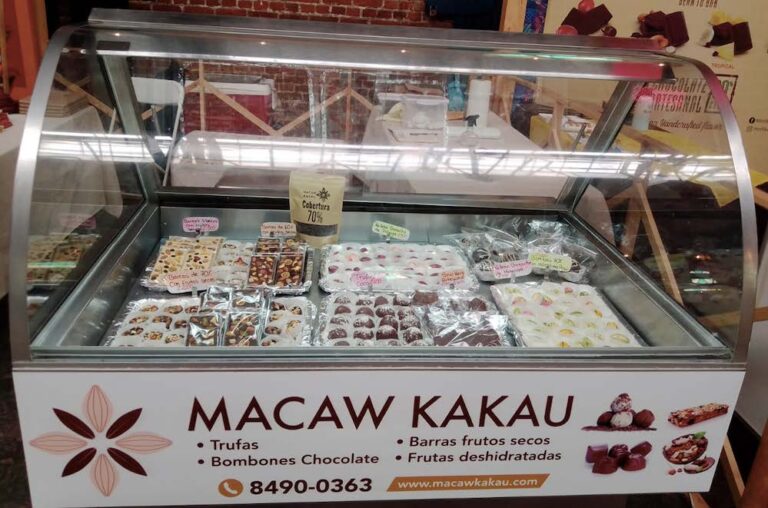
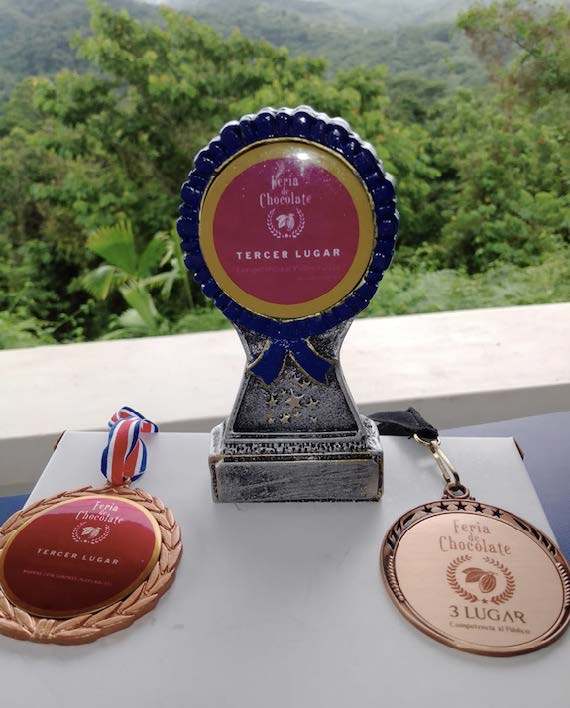
MAIN YOGA DECK EXPANSION: WE MADE IT BIGGER AND NICER
Our yoga deck just got bigger! It’s exciting to share with you some pictures and tell you about the bigger space for yoga we created. Our main deck, close to the lagoons and gardens, has additional 50 meters squared, almost 540 square feet extra. Thanks to this new build, it now fits 35 to 40 people. The pool next to this new space is one of our favorite elements: it adds fluid sound, a repetitive and soothing rhythm, and a general sensation of tranquility. To our garden views, we added a white lotus. Just planting this, we are waiting for the flowering, for that beautiful short moment. It symbolizes Peace and it is exactly the universal message we want to bring and create. Stay informed and wait for our news about upcoming yoga and wellness retreats in our social media:
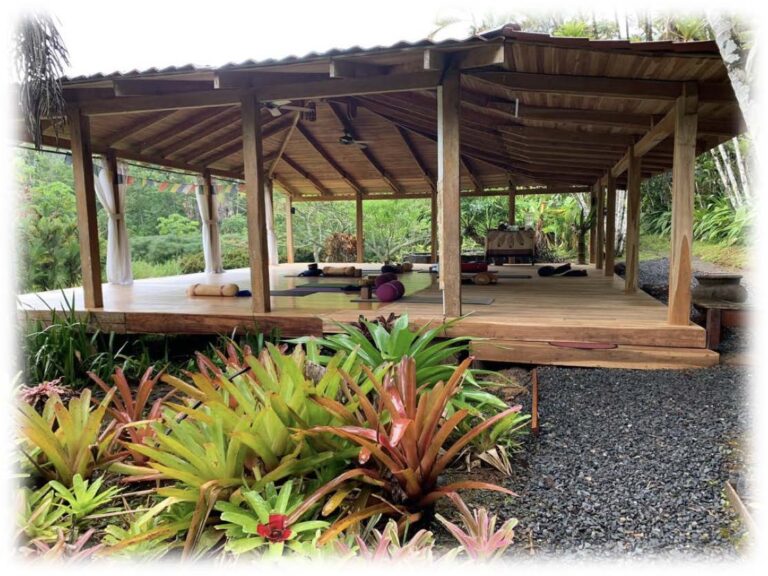
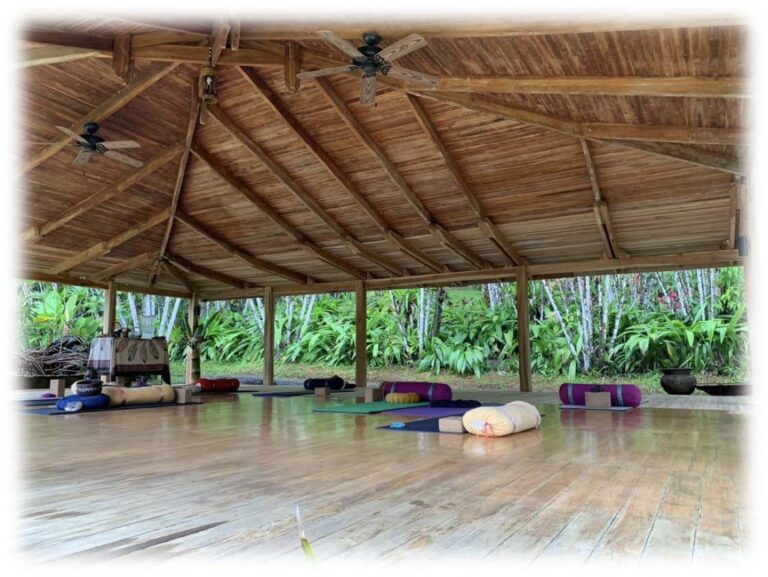
GLOBAL BIRDING DAY: WE COUNTED MANY SPECIES OF BIRDS ON OUR PROPERTY
‘We woke up around 3:00 AM, leaving San Mateo to arrive and start birding at Macaw around 5 towards 5:30 AM. Right before the entrance of Macaw, we spend the first minutes looking at different species. It’s a forest that is a bit more dry, more like Carara National Park. Once you enter Macaw, it is way more humid. The species you will spot are different. By the bus stop, almost before the entrance, we spot our first birds.
It was four of us that spent the whole day looking, searching, spotting, watching, counting. We managed a total of 119 species. We came number 14 out of 15 in Costa Rica. My favorite species to see is Pysaetus tyrannous, a small eagle. If not, the green ibis. A species that is not so rare, but here in the Pacific is hard to find. According to literature, and the database Ebird, it’s rare to see in this part of Costa Rica. But Macaw, yes, it’s here. Five or six months ago, you could se it in the lake as if nothing. Here are some pictures. We saw it near the river. So yes, the green ibis is amazing to watch. It’s not common in this area.
What I love the most about birding at Macaw is that there are so so many species to watch. In 60 minutes, you can watch 60 types of birds. From this point of view, it’s beautiful. You can see so many in such little time. Clearly after such spaces, the rhythm is not as impressive. The same restaurant can reveal a lot, a long list. It’s a combination, it’s a transition forest, with one part dry and another part humid. Or the Green Ibis, it’s not Pacific, it’s not Caribbean.
It has the advantage that this open area, you can find such a big variety and diversity of birds. There is also the area of primary forest near the waterfall. The volume of birds gets lower, but the rarity, the least common ones, in this part of the forest. Let’s say, that Macaw Lodge is a birding space for any type of birder: beginners, who do not know much and are happy watching the easier more accesible kinds, and experts, who love the challenge, the hidden, the rare.’
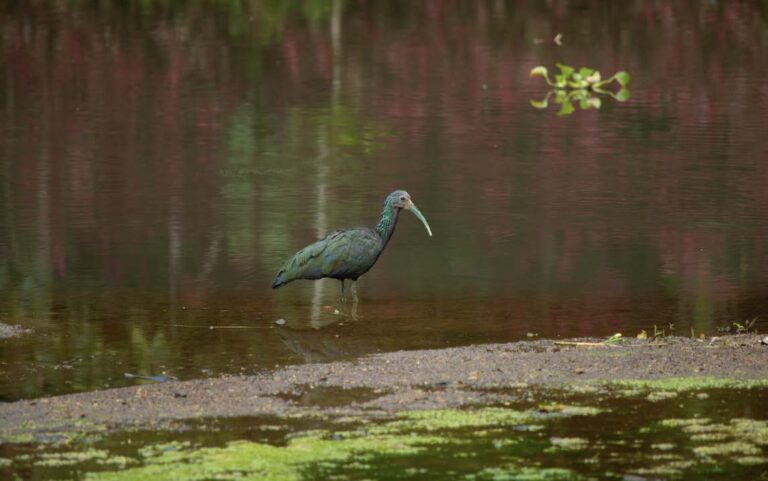
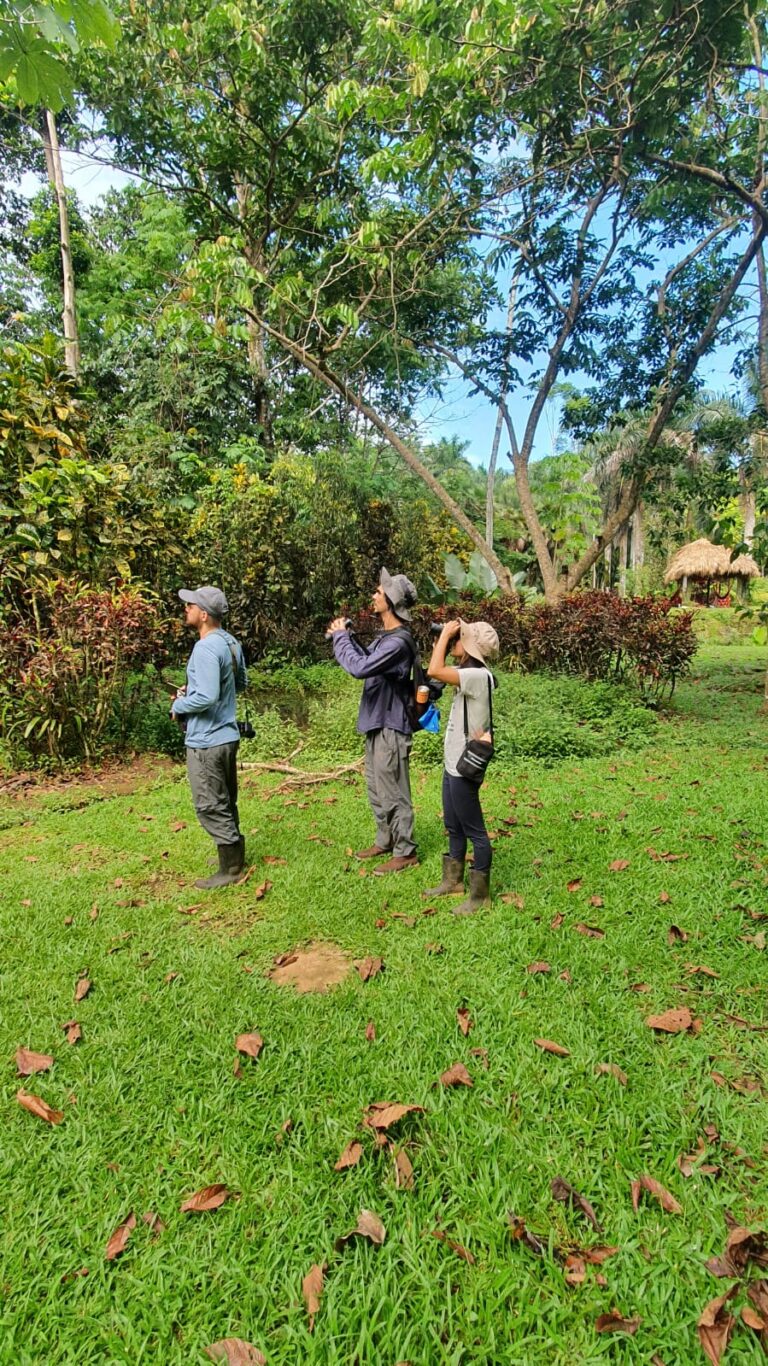
Ready to visit? To plan your travel and your stay, please feel free to reach out to us:
Email: travel@macawlodge.com
Whatsapp: +506 8762 9090
Phone: +506 8310 9073
Written by Gabriela Mateo
Newsletter: August 2022
Newsletter: August 2022
'Don't look at the big, overwhelming issues of the world. Look in your own backyard. Look in your Heart. What do you care about that isn't right where you live? Fix it.'
YOGA WITH ANALU AND MUSIC WITH TAPADO VARGAS

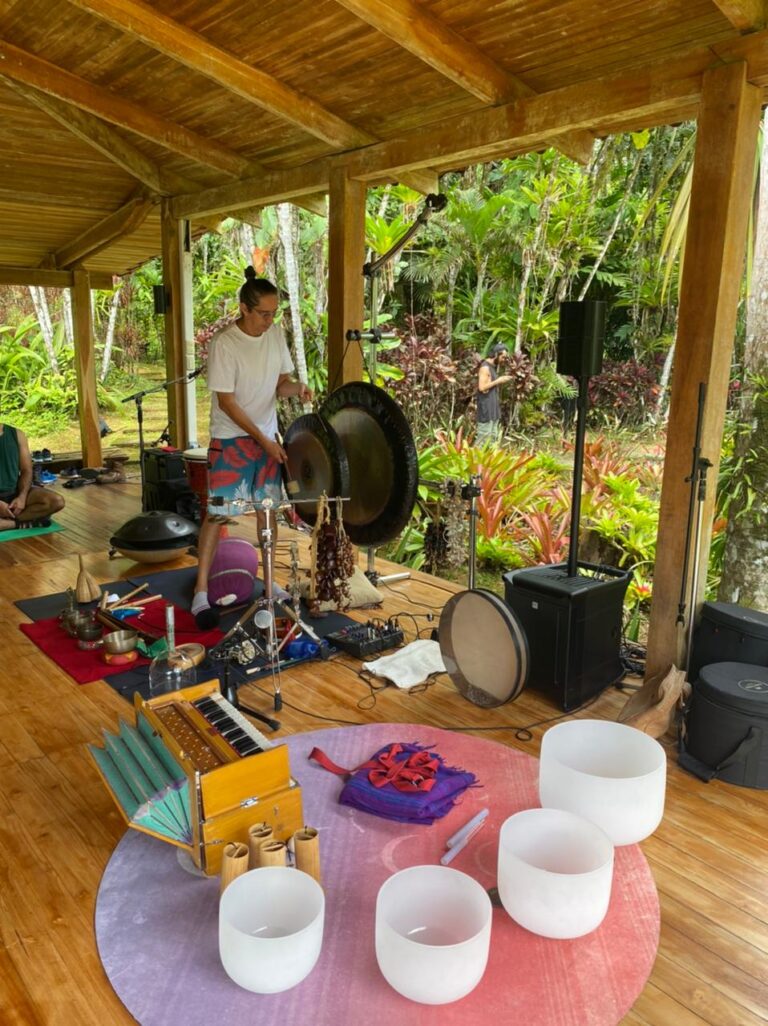
PURPLE CROWNED FAIRY HUMMINGBIRD
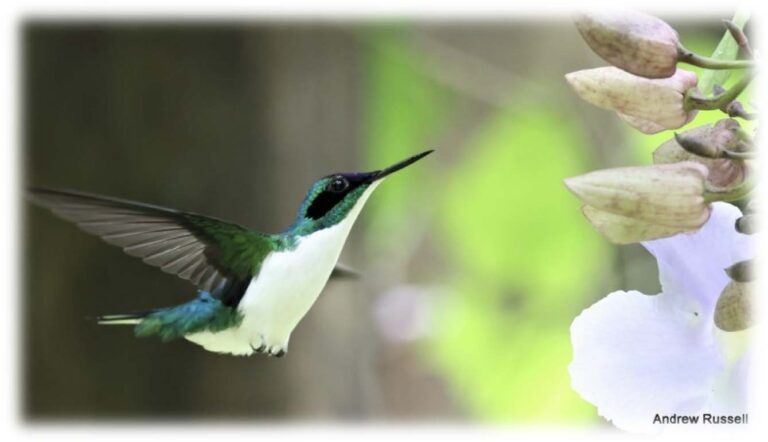
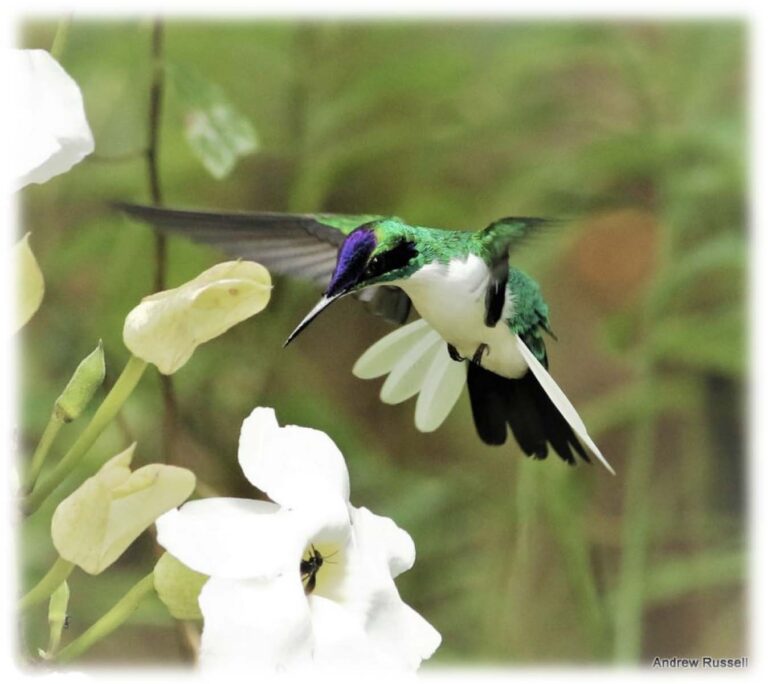
RECYCLING WITH NEIGHBORS IN TARCOLES
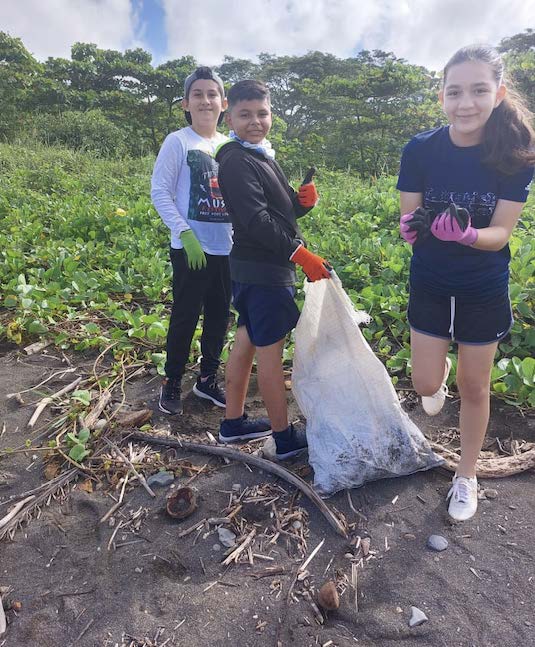
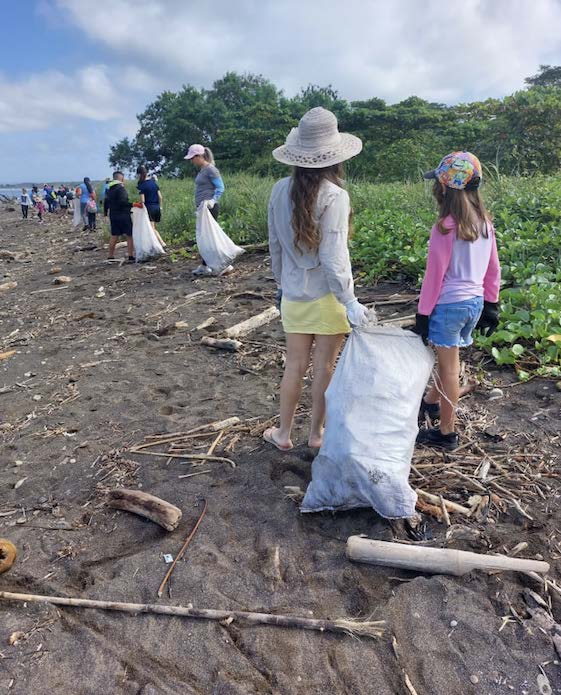
Ready to visit? To plan your travel and your stay, please feel free to reach out to us:
Email: travel@macawlodge.com
Whatsapp: +506 8762 9090
Phone: +506 8310 9073
Written by Gabriela Mateo
